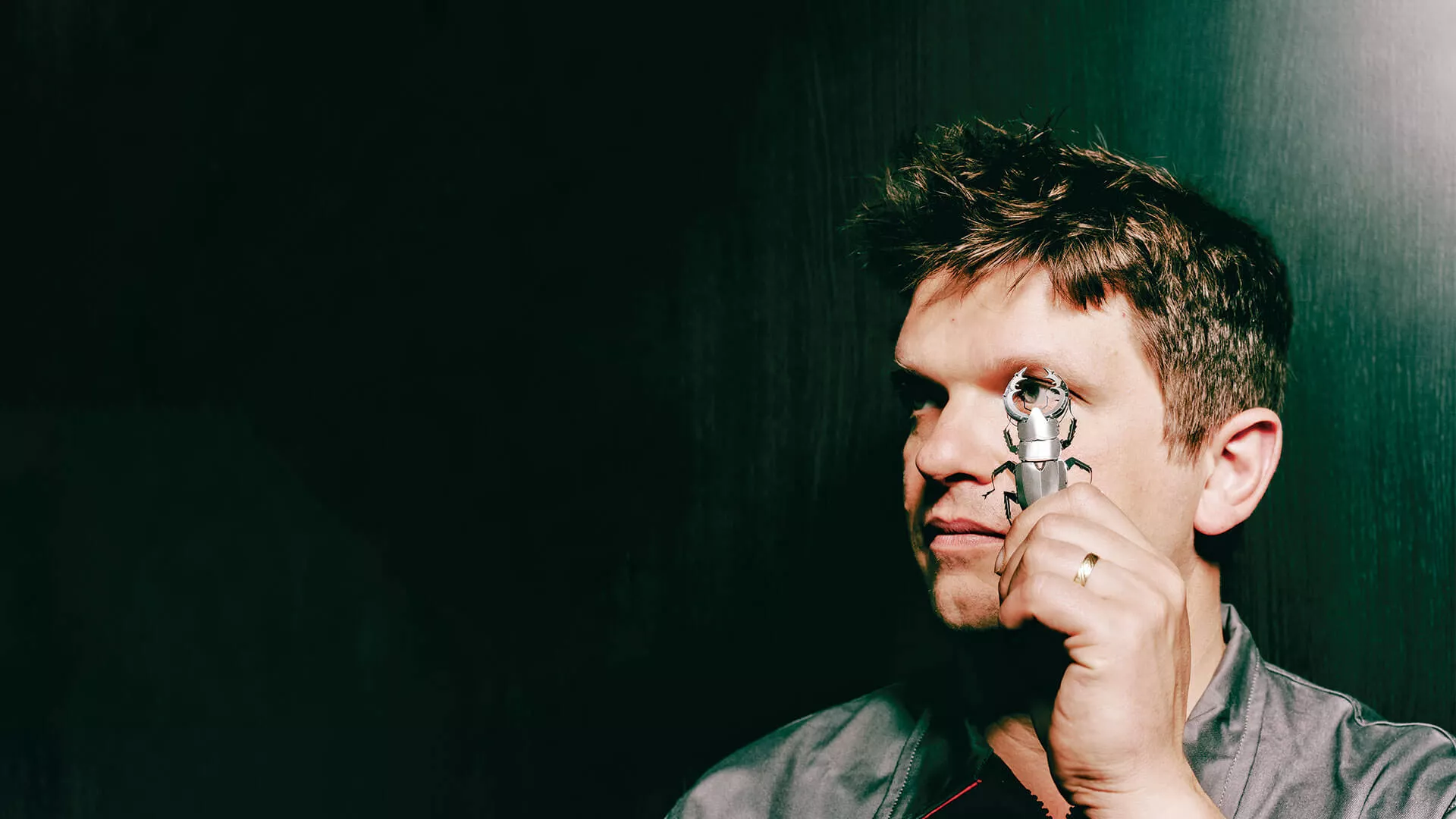
Jean-Gabriel Levon, The pioneering spirit
Short of ideas? Certainly not Jean-Gabriel Levon.
The co-founder of Ynsect, leader in insect-based ingredients, likes nothing more than to design innovative projects and embark on new adventures, especially when there is a challenge to be met. “Creativity gives meaning to my job as an entrepreneur”, he tells us in the Parisian premises of Ynsect, close to Gare de Lyon. Going back ten years, a report from the United Nations Food and Agriculture Organisation (FAO) stirred the curiosity of Jean-Gabriel Levon and two of his high school friends, Fabrice Berro and Alexis Angot. How are we going to feed the world in 2050? The trio examined the question further and discovered that “insects are the forgotten component when it comes to the agro-food system. Yet they are able to digest complex proteins, like those of bran (the husk of the wheat grain), in a much more efficient way than vertebrates. Adding this link in the chain makes these proteins accessible to both pets and humans.” With his two comrades and the agronomist Antoine Hubert, Jean-Gabriel Levon created the company Ynsect in 2011. His ambition? To feed the world with the help of insects.
The solution lies in experimentation
The founders are focusing on the mealworm (Tenebrio molitor), a high-potential edible beetle larva from which three types of useful ingredient can be extracted: proteins, oils and excrement. The majority of the proteins and oils produced in this way by Ynsect go to the pet food and aquaculture sectors. But two years ago, the company was granted the necessary permissions to sell the larval excrement known as ‘frass’ as a fertiliser ‘suitable for use in organic farming’. With the acquisition of the Dutch company Protifarm at the start of the year, Ynsect is also expanding in the human food segment (sports nutrition) which should take off following approval by the European Union with the first tentative servings of insect-based foods at the human dining table, after a somewhat tortuous regulatory licensing process.
The Tenebrio molitor breeding programme at Dole in the Jura region of France is the result of many experiments. How should we take care of insects? In what light, temperature and humidity conditions should they be kept? Which foods should they be used in? And in what proportion should they be used? For supplying water to the beetles, for example, the entrepreneurs tested multiple options. It took four years of experimentation to find the solution. “Ten years ago, the factory farming of Tenebrio molitor was unknown, anywhere in the world, explains Jean-Gabriel Levon. There was no expert who could tell us how.
With our research partners and our R&D department, we are gradually moving the science forward.
We operated on an ongoing trial basis, taking our mistakes into account, and integrating them into a continuous improvement process.” Ynsect’s disruptive technologies are now protected by 300 patents, and the company is currently working on a project to gain a clearer understanding of the molitor beetle genotype. “With our research partners and our R&D department, we are gradually moving the science forward.”
It is clear that innovation and entrepreneurship are central to Jean-Gabriel Levon’s work ethic. It seems that this mindset is inherited from his family, parents and grandparents, who include a stone cutter and a steel rolling mill operator…
Having followed an elite education—École polytechnique, HEC Paris— he has all the necessary tools in engineering, strategy and business at his disposal. His first work experience as a consultant at Schlumberger led him to work in the energy sector, at the height of peak oil (2008-2010). After extensive travel around the world, Jean-Gabriel Levon wanted to finally “put his bags down” in France. By switching from energy to food, he switched from one critical global issue to another.
“At Ynsect, I put together a new team, I launched the strategy and then I recruited a more competent person to replace me and implement it.” Every six to twelve months, he asks himself the same question: “Should I stay? Or go?” But after ten years, he is no longer counting the positions he has held: president and general manager, operations director, marketing director… So if he were to undertake just one role, which would it be?
The director of the first Ynsect production facility, which opened in Dole in 2016. This experience turned out to be conclusive (1,000 tonnes produced per year, 50 employees), providing a striking demonstration of the company’s merits.
I see the company as a player in society, helping to build a better world. A real machine for change.
The world’s largest vertical farm
The Dole farm made it possible to launch the first size-optimised plant for breeding Tenebrio molitor. Under construction near the city of Amiens, this site will produce 100,000 tonnes when it is launched in 2022, then double that in 2023. At 36 metres high, it will be the largest vertical farm in the world and the first that is “carbon negative” (sequestering more CO2 than it will emit).
Up to now, 105 million euros in contracts have been signed and Jean-Gabriel Levon has taken up a new position as Chief Impact Officer, developing a climate and biodiversity strategy. “Measuring Ynsect’s environmental impact through a complete lifecycle analysis is essential. 85% of our carbon impact relates to energy and the purchase of raw materials (cereals used as bedding and food for insects).” The company has already begun its transition from fossil fuels (gas) to electricity, although not without difficulties. “In industry, we have varying but continuous needs. For now, intermittent solutions like solar or wind power are a challenge: we can’t just ‘turn the insects off!’ in a power cut.” With the TerreHa 2040 project, the company intends to reduce emissions by developing subsidiaries in the low-carbon wheat and rapeseed sectors. Among the pledges announced is the planting of 1,700 km of hedges across 1,100 farms. Over the last ten years, sustainability has become central to the firm’s strategy. “We want to feed the world in a sustainable way”, explains Jean-Gabriel Levon, citing, in addition to Ynsect’s green credentials, their social activism, with a base salary 35% higher than the minimum wage, paternity leave of ten weeks and stock options for employees. The co-founders have even enshrined its position on societal and environmental impact in Ynsect’s Articles of Association. “This allows us to refuse a project that is motivated solely by profit. I see the company as an actor in society, helping to build a better world. A real machine for change, if you will.”
“Building a smile, a bond, and enthusiasm”
His vision goes hand in hand with a planetary ambition: “Our contribution will only be meaningful if we reach global volumes. We intend to set up dozens of factories modelled on the vertical farm in the large cereal producing regions (Europe, South-East Asia, North America), where our raw material is located.” Jean-Gabriel Levon considers insects as one solution among others. “I believe in a regional resilience based on a mosaic of practices: insects, peas, algae…” He also sees his own future as a mosaic of many different business and personal projects driven by the unifying desire to inject more humanity into everything he does. “Building a smile, a bond and enthusiasm: providing decent living conditions for all humanity. Regret is a useless emotion. So you have to believe in the future and move on.”
With your feet on the ground … and your head in the stars? “Space is an extraordinary field of experimentation! Technology deployed in vertical farms and systems automation in a controlled atmosphere could ensure food production in space. Today, this is still something of a dream but we are always looking out for opportunities.” Certainly each day is a pristine page waiting to be written!





